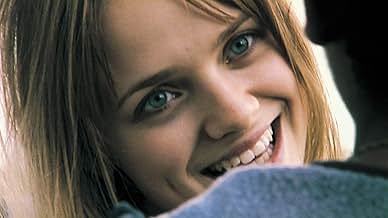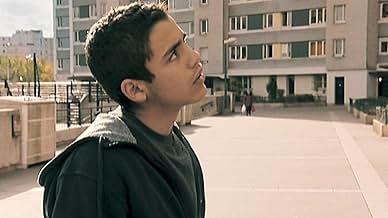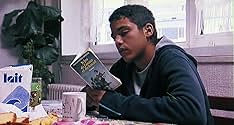AVALIAÇÃO DA IMDb
6,9/10
3,3 mil
SUA AVALIAÇÃO
Adicionar um enredo no seu idiomaKrimo a 15 years old shy boy falls in love for Lídia who is his classmate.To be able to assume his love for her he decides to take a part in the play that was to be one of his friends.Krimo a 15 years old shy boy falls in love for Lídia who is his classmate.To be able to assume his love for her he decides to take a part in the play that was to be one of his friends.Krimo a 15 years old shy boy falls in love for Lídia who is his classmate.To be able to assume his love for her he decides to take a part in the play that was to be one of his friends.
- Direção
- Roteiristas
- Artistas
- Prêmios
- 16 vitórias e 5 indicações no total
Meriem Serbah
- Krimo's Mother
- (as Meryem Serbah)
Avaliações em destaque
The life of a band of teenager in a suburb near Paris. But instead of showing what would be the "urban legend" of this kind of poor suburb (violence, rapes...), Abdelatif Kechiche shows us what's the daily life of those guys: not much to do, not much dreams. Still, some of them have fun rehearsing for a play. Among those "players", Lydia, long time friend of Krimo... And Krimo, a bit shy, finds himself in love with this joyful girl. The good thing in this movie is that it shows the suburb as it can be : not really fun but not the awful thing we think it is. No, they're not all juvenile delinquents. Their lives are just no fun. And yes, they don't speak like Moliere did, yes they use F words. It's the way they talk to each other. But when talking to adults, they're just very polite. And even if there's no much suspense in this movie (it's just about wondering if Krimo will go out with Lydia), L'Esquive shows another suburb. A suburb where teenagers (all french, but from different origins, from Spain to Asia) are not dangerous people.
10fedka2
This is a dream film, of which I am so entirely thrilled that it received so many awards over the mediocre but over hyped Rois et reine. The self effacement of the director in this film is impeccable, one has the eerie sense of watching a Fred Wiseman documentary. It is true that dialogue can run long and circuitously, but for those with my taste for extreme realism this can only be a downside if the acting is poor, and in l'esquive it is not. The acting is on the contrary frighteningly good, whatever self consciousness the members of this young cast might have before the camera is immediately absorbed in the documentary-like mise en scene, that is to say, it only furthers the sensibilities and aesthetic as a whole. L'esquive is a singular film that we can only hope will influence a generation of young French filmmakers who are tired of the well lit, over produced cinema this country is getting far too comfortable with.
This French film is a quite disheartening look at life in the public housing projects outside Paris. In a crumbling neighborhood with a majority of immigrants from Northern Africa, a high school tries to produce a play by Pierre Marivaux (1688-1763). The heart of the film is the budding romance between the vivacious blonde Lydia (one of the few "native" French living in the neighborhood) and the shy and painfully inarticulate Krimo, who is ridiculized by his thuggish friends for taking a part in the play. All the kids speak in an unintelligible slang, which makes a contrast with the classical French of Marivaux. I wrote it was disheartening (despite not being a drama) because it shows that the marginalized inhabitants of the projects have an almost nil chance of breaking into the mainstream of French society. Thoughtful and worth seeing.
I really did like this film! - those viewers, French or otherwise, who have seen, and been able to follow the sound track of La Haine, will be quite at home in this environment, will know what to expect, and will be sensitive to the message the film conveys. True, it may lack the sort of 'excitement'that some film-goers may seek, but one has to take it for what it is: a hard-hitting social document which will resonate with many who are familiar with the inner-city tensions found in many French towns in recent years. The gambit of choosing amateur actors worked very well,in my opinion, a point which other viewers seem to echo.
"Games of Love and Chance (L'Esquive)" is an involving experiment in giving classic French comedy of errors relevance to today, in a dramatic demonstration of "Plus ça change, plus c'est la meme chose" -- the more things change, the more they stay the same.
Writer/director Abdellatif Kechiche juxtaposes the titular 18th century work by Marivaux with junior high kids in a poor, inner city Arab immigrant neighborhood, for an effect that crosses Larry Clark's "Kids" with "Mad Hot Ballroom." Like any period farce, the real relationships are dizzyingly circular: A loves B who loves C who is in disguise with D. A threatens C, B changes places with D to pursue his suit and use Marivaux like Cyrano, C can't make up her mind, friends of B and C misunderstand everyone, and the course of true love doesn't run smooth.
While marred by wincingly heavy-handed intellectualizing on class social criticism by the literature teacher who is directing the kids in the play and a deus ex machina insertion of biased cops, the frank life and death-ness of adolescent romance strongly comes through in comparison to Marivaux's mannered floweriness, even as these kids communicate amongst each other with four letter obscenities, bluntly crude slang (that may not be too well represented in the English subtitles but I'm sure French subtitlers likewise have trouble with the patois in movies such as "Four Brothers"), heart-tugging looks of longing, painfully hurt tears, and, finally in frustration, physical action.
It is not clear if "the blonde" as she is referred to in the English subtitles (played by the excellent Sara Forestier, who seems to have been the only member of the cast with some previous experience before the cameras) is also from an immigrant family or Muslim, or if she just picked up use of a couple of Muslim catch phrases in her slang as to whether Kechiche is adding another layer of social commentary. Or she could just be part of the trend in French cinema to fixate on pouty young blonde temptresses, viz. "La Petite Lili," "À Tout de Suite (Right Now)," "Lila Says (Lila dit ça)."
This film has a lot of parallels with "Lila Says (Lila dit ça)," not just about sex and social setting, though it dealt with older kids, but also how literature can be an escapist outlet yet also a threat that brings hidden emotions to the fore.
The grim mise en scene makes wonderful use of a crowded, high rise neighborhood where the kids hang out chilled because they have little privacy at home, some fathers are in jail, their loving mothers try to keep tabs on them, and cell phones are their expensive lifelines.
While the film goes on a bit too long as scenes meander, probably because it isn't clear how much has been scripted and how much the kids are very effectively improvising particulars around a basic story line, their relationships are enthralling, both the romances and the friendships. Each teen actor creates an indelible and different character.
270 years since Marivaux and the human heart hasn't changed.
Writer/director Abdellatif Kechiche juxtaposes the titular 18th century work by Marivaux with junior high kids in a poor, inner city Arab immigrant neighborhood, for an effect that crosses Larry Clark's "Kids" with "Mad Hot Ballroom." Like any period farce, the real relationships are dizzyingly circular: A loves B who loves C who is in disguise with D. A threatens C, B changes places with D to pursue his suit and use Marivaux like Cyrano, C can't make up her mind, friends of B and C misunderstand everyone, and the course of true love doesn't run smooth.
While marred by wincingly heavy-handed intellectualizing on class social criticism by the literature teacher who is directing the kids in the play and a deus ex machina insertion of biased cops, the frank life and death-ness of adolescent romance strongly comes through in comparison to Marivaux's mannered floweriness, even as these kids communicate amongst each other with four letter obscenities, bluntly crude slang (that may not be too well represented in the English subtitles but I'm sure French subtitlers likewise have trouble with the patois in movies such as "Four Brothers"), heart-tugging looks of longing, painfully hurt tears, and, finally in frustration, physical action.
It is not clear if "the blonde" as she is referred to in the English subtitles (played by the excellent Sara Forestier, who seems to have been the only member of the cast with some previous experience before the cameras) is also from an immigrant family or Muslim, or if she just picked up use of a couple of Muslim catch phrases in her slang as to whether Kechiche is adding another layer of social commentary. Or she could just be part of the trend in French cinema to fixate on pouty young blonde temptresses, viz. "La Petite Lili," "À Tout de Suite (Right Now)," "Lila Says (Lila dit ça)."
This film has a lot of parallels with "Lila Says (Lila dit ça)," not just about sex and social setting, though it dealt with older kids, but also how literature can be an escapist outlet yet also a threat that brings hidden emotions to the fore.
The grim mise en scene makes wonderful use of a crowded, high rise neighborhood where the kids hang out chilled because they have little privacy at home, some fathers are in jail, their loving mothers try to keep tabs on them, and cell phones are their expensive lifelines.
While the film goes on a bit too long as scenes meander, probably because it isn't clear how much has been scripted and how much the kids are very effectively improvising particulars around a basic story line, their relationships are enthralling, both the romances and the friendships. Each teen actor creates an indelible and different character.
270 years since Marivaux and the human heart hasn't changed.
Você sabia?
- CuriosidadesThe movie is dedicated Slaheddine.
- ConexõesReferenced in Leçon de cinéma: Arnaud Desplechin et Mathieu Amalric (2019)
- Trilhas sonorasWarini Werak Tergoud
Performed by Cheba Zahouania
Written and Composed by Cheikha Rimitti
Production: MLP / History
Principais escolhas
Faça login para avaliar e ver a lista de recomendações personalizadas
- How long is Games of Love and Chance?Fornecido pela Alexa
Detalhes
- Data de lançamento
- País de origem
- Idioma
- Também conhecido como
- Games of Love and Chance
- Locações de filme
- Saint-Denis, Seine-Saint-Denis, França(Cité des Francs-Moisins: housing complex, Rue du M.al Lyautey: police control)
- Empresas de produção
- Consulte mais créditos da empresa na IMDbPro
Bilheteria
- Faturamento bruto nos EUA e Canadá
- US$ 8.085
- Fim de semana de estreia nos EUA e Canadá
- US$ 2.529
- 4 de set. de 2005
- Faturamento bruto mundial
- US$ 1.747.263
- Tempo de duração1 hora 57 minutos
- Cor
- Mixagem de som
- Proporção
- 1.85 : 1
Contribua para esta página
Sugerir uma alteração ou adicionar conteúdo ausente
























